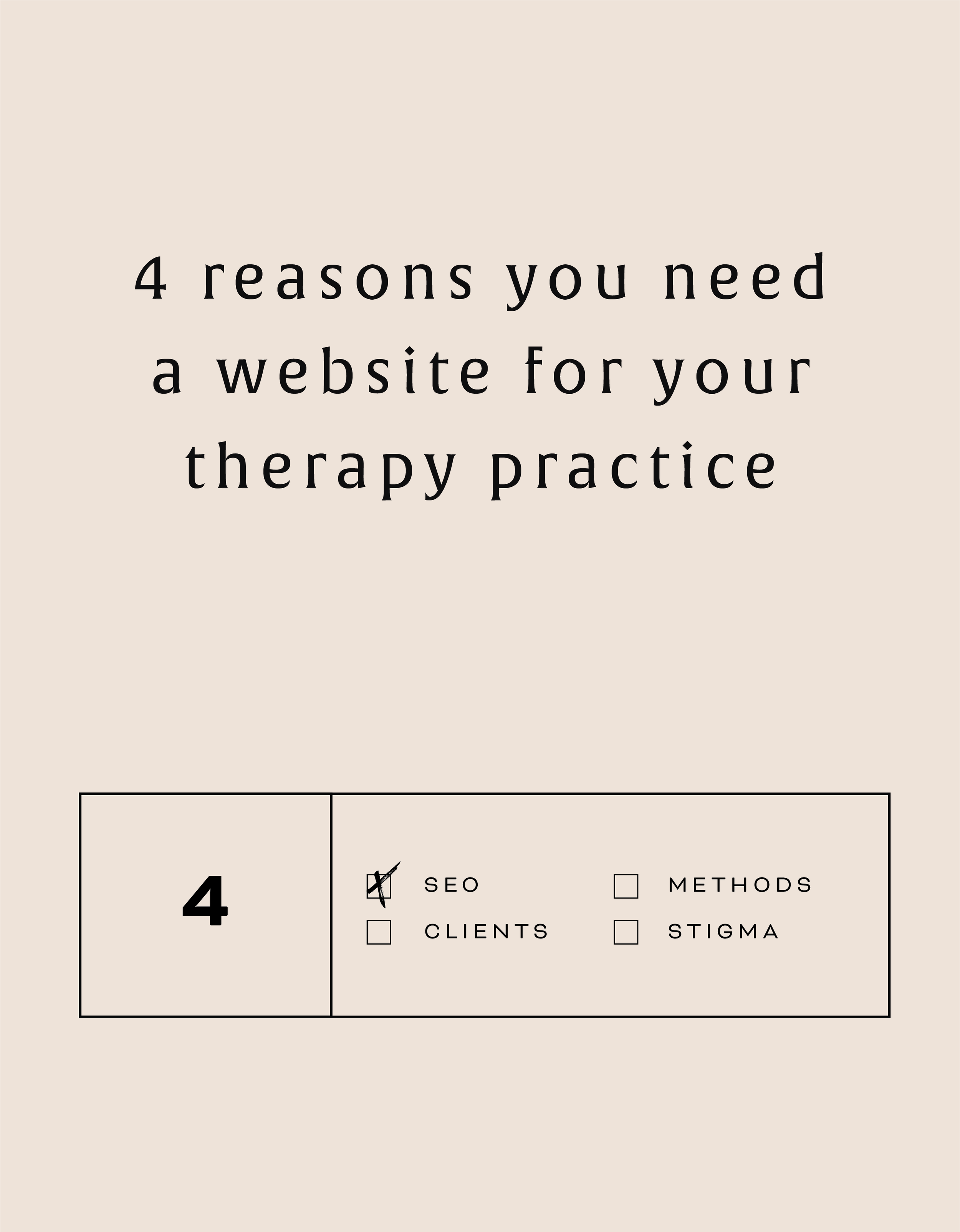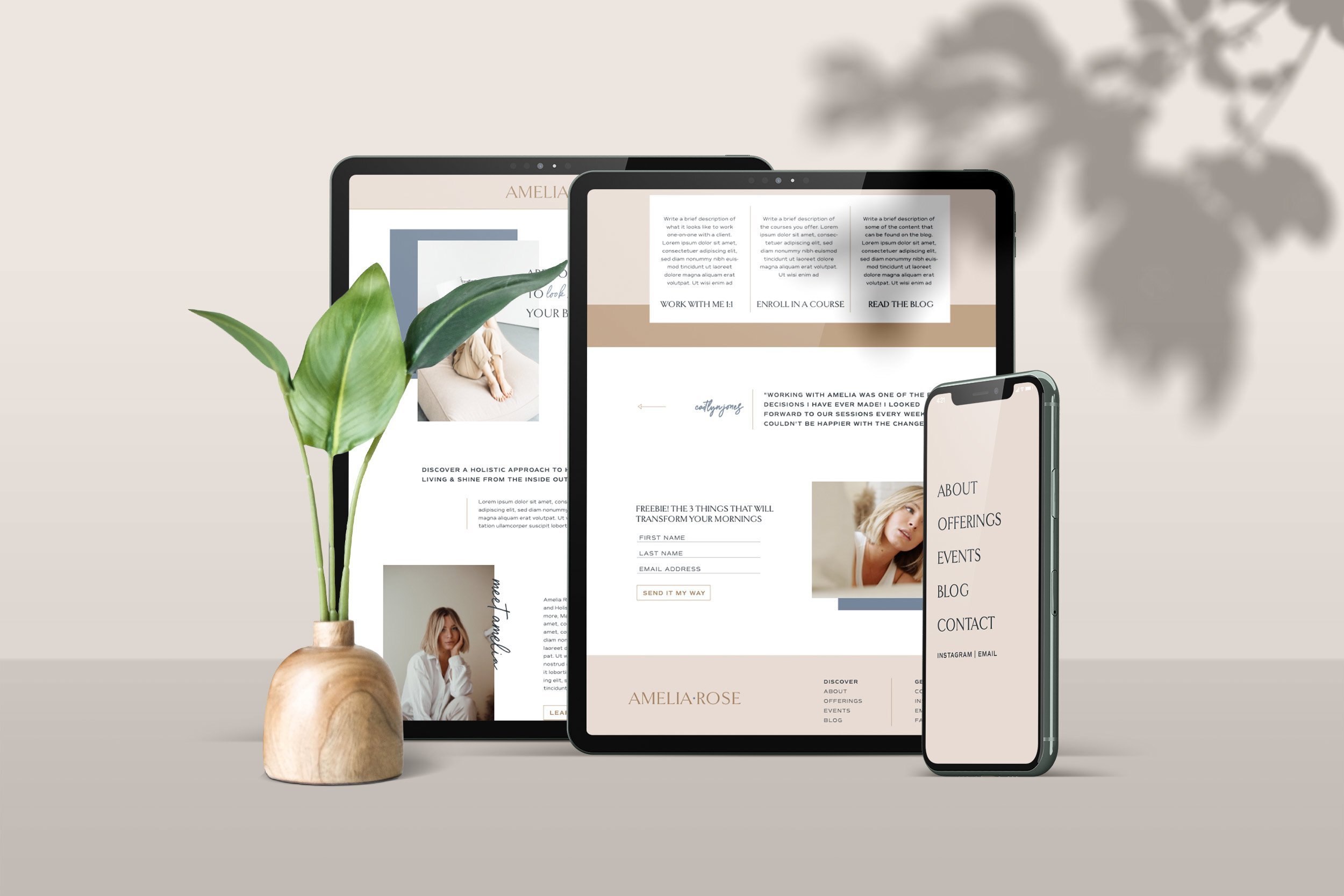Why You Need a Mood Board for Your Private Practice Logo
Discover why private practice therapists need a professional logo and why a mood board is the crucial first step with therapy logos to build trust, attract more clients, and boost income with expert logo design for therapists.
If you’re a therapist in private practice, chances are you’ve spent a lot of time learning how to help people—but maybe not as much time thinking about your branding. One of the most overlooked (yet powerful) parts of building a successful practice is your logo.
But before a designer dives into the details of the logo itself, they will create a mood board. A mood board is an internal tool created to ensure that the logo designer is on the same page with their client. This mood board should of course convey the mood and vibe of the brand, but how does that translate to private practice therapists?
First Impressions Matter in Private Practice
When someone searches online for a therapist, they’re often feeling vulnerable, overwhelmed, or uncertain. Your branding is going to be one of the main visuals a potential client interacts with before deciding to contact you. The mood board is going to make sure that the vibe they are visually processing is the same vibe they will have when they work with you. Through photos, colors and graphic elements, you should be able to get the look and feel your going for and make sure it matches what you want in a logo for your private practice.
Logos for Your Therapy Practice Build Trust and Connection
A well-crafted logo isn’t just about looking pretty—it’s about creating an emotional connection. The colors, shapes, and typefaces in your logo do more than decorate—they set the tone for your practice:
Bold, vibrant palettes convey energy, confidence, and momentum.
Minimalist layouts with ample white space communicate focus and simplicity.
Hand-drawn or textured elements suggest authenticity, warmth, and a personal touch.
Geometric patterns can highlight balance, structure, and stability.
Elegant serif fonts evoke tradition, wisdom, and trust.
When your logo mirrors the feelings your clients hope to find, it makes it easier for them to picture a meaningful connection with you—often before they’ve even reached out. And the first step is to map these elements out in a mood board. The mood board will showcase your color palettes, font examples, iconography and photography. All of these should work together to create the emotional tie the logo will bring to life.
Standing Out in a Crowded Field
Let’s be honest: the therapy world is crowded, especially in cities and online platforms. Many therapists offer similar services, and clients often scroll through dozens of profiles before making a decision.
A distinctive, professional therapy logo design helps your practice stand out. Instead of blending into a sea of text-heavy listings, your visual identity makes you memorable. The right design can set you apart as the therapist who “feels right” even before a consultation call.
A Mood Board Helps Nail Down Who Your Client Is
By gathering colors, images, fonts, and textures that reflect the feelings you want clients to have when they first encounter your practice, you start to see patterns emerge. Maybe your ideal client is drawn to calm neutrals and open space, signaling a need for safety and groundedness. Or perhaps they resonate with bold, confident colors and modern typography, pointing to a desire for growth, change, and clarity.
The process forces you to move beyond “what looks nice” and into “what feels right for the people I want to reach.” A strong mood board becomes the foundation of a logo that doesn’t just look professional—it speaks directly to the clients you’re hoping to serve.
When you start your logo design process with a mood board, you’re not just picking colors or fonts—you’re setting the emotional stage for how clients will experience your practice before they ever sit down with you.
It’s the difference between guessing what might resonate and intentionally shaping the first impression you want to give.
A mood board turns your values, vision, and ideal client into something tangible. And once that foundation is in place, the logo practically designs itself—because it’s rooted in meaning, not just aesthetics.
That’s why the best therapy logos always begin with a mood board. It ensures your brand feels consistent, authentic, and aligned with the clients you most want to reach. More than a creative exercise, it’s an act of clarity—one that allows your logo to truly work for you, welcoming the right people in and helping your practice grow with purpose.
Looking for a custom logo design for your therapy practice?
Skip the overwhelm and get a logo
designed that authentically matches your therapy style.
Why Private Practice Therapists Need a Well-Designed Logo
Discover why private practice therapists need a professional logo. Learn how therapy logos build trust, attract more clients, and boost income with expert logo design for therapists.
If you’re a therapist in private practice, chances are you’ve spent a lot of time learning how to help people—but maybe not as much time thinking about your branding. One of the most overlooked (yet powerful) parts of building a successful practice is your logo.
A strong, thoughtfully designed logo can make a big difference in how potential clients see you, whether they choose to reach out, and ultimately how your business grows. Let’s explore why logo design for therapists matters and how the right therapy logos can help you book more clients and increase your income.
First Impressions Matter in Private Practice
When someone searches online for a therapist, they’re often feeling vulnerable, overwhelmed, or uncertain. Your logo is often the first visual element they see on your website, business card, or Psychology Today profile.
A professional therapy logo sends the message that your practice is established, trustworthy, and competent. On the other hand, a dated or generic logo—or worse, no logo at all—can unintentionally make your practice feel less credible. In a competitive market, that first impression can be the difference between a potential client reaching out or moving on.
Therapy Logos Build Trust and Connection
A well-crafted logo isn’t just about looking nice—it’s about creating an emotional connection. The colors, shapes, and typography you choose communicate subtle messages about your style and approach:
Soft, calming tones suggest warmth and safety.
Clean, modern lines communicate professionalism and clarity.
Nature-inspired imagery can evoke growth, healing, and renewal.
When your logo resonates with the feelings a client is looking for, it becomes easier for them to imagine working with you. That trust-building starts before the first session.
Standing Out in a Crowded Field
Let’s be honest: the therapy world is crowded, especially in cities and online platforms. Many therapists offer similar services, and clients often scroll through dozens of profiles before making a decision.
A distinctive, professional therapy logo design helps your practice stand out. Instead of blending into a sea of text-heavy listings, your visual identity makes you memorable. The right design can set you apart as the therapist who “feels right” even before a consultation call.
How a Logo Impacts Your Bottom Line
Investing in professional logo design for therapists isn’t just about aesthetics—it’s about business growth. Here’s how a great logo translates into more clients and revenue:
Higher conversion rates: A polished brand encourages potential clients to click, call, or book.
Better word-of-mouth: Clients are more likely to share your website or business card if it looks professional.
Premium positioning: A well-designed logo allows you to charge fees that reflect the quality of your services.
Think of your logo as a long-term investment in your private practice. It works for you every day—on your website, your intake forms, your social media—helping attract the right clients and reinforcing the value you provide.
Your skills as a therapist are what truly change lives—but let’s be honest, your logo is often what gets people to knock on the door in the first place.
Think of it as the friendly wave before the deep conversation. A thoughtfully designed therapy logo gives your practice a quiet superpower: it builds trust, shows off your values, and makes you memorable in a crowded field.
If you’re ready to grow your practice (and make your future clients’ scrolling thumbs stop in their tracks), investing in professional logo design for therapists is a smart move. The right logo isn’t just pretty—it works hard behind the scenes to help your business flourish.
Looking for a custom logo design for your therapy practice?
Skip the overwhelm and get a logo
designed that authentically matches your therapy style.
Why you need a website for your therapy private practice
A large part of running a successful private practice is having a solid marketing strategy. If users can’t find your business online, then they are far less likely to become a client of your practice.
If you run a practice that is already full or tends to get plenty of word-of-mouth clients, then continue with your current marketing strategies. However, if you are like most private therapy practices, a website will only benefit you. A custom private practice website design will give potential clients the information they need to choose a therapist that best meets their needs.
If you aren’t convinced already, here are four reasons you need a thoughtful private practice website design:
SEO - If people can’t find your practice online, then they may never know you exist. A website will “put you on the map” and allow your private practice to start showing up when potential clients search for therapists in their area.
Connect with your ideal clients - A website tells your clients who you are and what people you serve. Your website has the ability to portray the atmosphere of your practice and help ideal clients feel connected and excited about the opportunity to become a client.
Shed the mental health stigma - For years, mental health has had a negative stigma around it. However, in the past few years, people are making strides towards a more positive outlook on mental health. When it comes to your website, you have the ability to push this movement forward with your website design. Good website design can help therapy-seekers feel seen and accepted. It can take away the fear many people may have about reaching out for help. Your website is a platform for you to show who you are and help potential clients feel connected to you from the start.
Accurately reflect you and your methodology - When searching for a therapist, people take a much more personal approach than in other industries. They want to know who their therapist is, their story, and how they can help them with the struggles they are walking through. While credentials and professional experience do hold value, clients will feel most seen and heard if they know that their therapist has walked through similar trials as they have. A good private practice website design will have information about your approach, your counseling options and your therapists’ bios.
If you’re just starting your private practice, get something up online! If users can’t find your business online, then they are far less likely to become a client of your practice. It doesn’t have to be perfect, but it should generally reflect your unique approach so you can help more people! We need what you have to offer!!






















